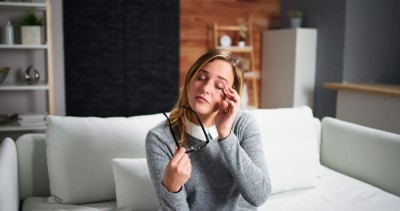Free shipping for orders over 39.00€
Fight insomnia and sleep soundly!

You did not recently take a transatlantic trip to have jetlag, and yet, during the night, you toss around in your bed? Are you unable to close your eyes until dawn? Do you not sleep more than six hours? Are you exhausted, limp, nervous during the day? That is because you suffer from insomnia, a common sleep disorder, which can nevertheless disturb... your everyday life!
Insomnia can be an isolated incident, but sometimes can last for months or years, and when it is not treated, it affects the health and quality of life of the human being. Insomnia can be primary (not to be relevant with another disorder) or secondary, that is, the result of another problem.
What causes insomnia?
What are the reasons that keep you awake at night?
Stress: work, school, studies, health, family are enough stressors that do not let the mind rest and lead the body to sleep. Also, some events that trouble and sadden the patient (such as death, illness, divorce, dismissal, failure) can easily lead to insomnia.
Anxiety: a post-traumatic stress disorder and anxiety disorders cause poor sleep and insomnia.
Depression: a person who suffers from depression can either sleep too much or experience insomnia problems. The same is caused by other mental disorders.
Underlying disease: there are several important diseases, such as arthritis, cancer, heart failure, gastroesophageal reflux disease, etc. associated with the manifestation of insomnia. Chronic pain, breathing difficulties, frequent urination also contributes to the problem.
Changes in the environment: any change in a person's daily schedule can cause dysregulation of his biological clock, making it difficult to sleep.
Bad habits: a person who sleeps at irregular hours, has activities that cause agitation at night, or tries to relax in an unsuitable environment for sleeping, may soon develop a problem of insomnia.
Medication: a range of drugs such as antidepressants, or pills for the heart, blood pressure, allergies, or corticosteroids, can affect your sleep. The same applies to non-prescripted drugs that may contain caffeine and other stimulants.
Caffeine, nicotine, alcohol: coffee, tea, and cola beverages are the "usual suspects" for insomnia, because of their stimulating effect, and it is advised not to consume them after noon. Nicotine is also a stimulant for the body. On the contrary, alcohol promotes relaxation, but excessive consumption does not allow the body to pass into the deeper stages of sleep and causes sleep disruption during the night.
Excessive consumption of food in the evening: overeating in the evening causes discomfort, while also being guilty of heartburn or acid regurgitations, thus causing insomnia.
Is insomnia linked to age?
Insomnia usually occurs at older ages, but it is not excluded that it will also occur in children and adolescents.
What are the insomnia symptoms?
- Inability to relax at night so that you fall asleep
- Waking up too early in the morning
- Feeling tired and atony in the morning
- Tiredness and drowsiness during the day
- Nervousness, anxiety, nerves, depression
- Inability to concentrate and memorize
- Accidents and failures
- Headache
- Gastroenterological discomfort
- Constant concern about the inability to sleep
Can insomnia be treated?
A combination of treatments can effectively help deal with insomnia.
Behavioral therapies: a person is trained to adopt good sleep habits, improving the sleep environment, developing relaxation techniques, controlling external stimuli, by applying phototherapy, etc.
Medication: the doctor examines the patient's history and suggests prescription or non-prescripted drugs, to treat chronic insomnia.
Alternative therapies: acupuncture, yoga, meditation are techniques recommended to treat insomnia. In addition, there are some supplements, that stimulate the body with nutrients that regulate the patient’s biological clock and treat insomnia in a natural way. In particular:
Magnesium: Magnesium activates the patient's nervous system, responsible for the relaxation and calmness of the body. Furthermore, it interacts with the neurotransmitter that helps to cope with the feeling of anxiety, preparing the body for sleep. Finally, it reduces stress-inducing hormones, contributing to muscle relaxation.
Melatonin: the so-called" sleep hormone", is produced by the brain's epiphysis and is responsible for regulating the circadian rhythm of the body and managing the natural cycle of sleep. Studies in children and adults have shown that melatonin reduced the time it took a person to fall asleep, increased overall sleep time, and improved its quality.
Valerian: valerian root contains several compounds that promote sleep and reduce anxiety, offering a feeling of calm that promotes sleep.
Passionflower: the" passion fruit " (passionflower) is also the fruit to relieve insomnia and anxiety, since it reduces brain activity and brings relaxation and better sleep quality.







